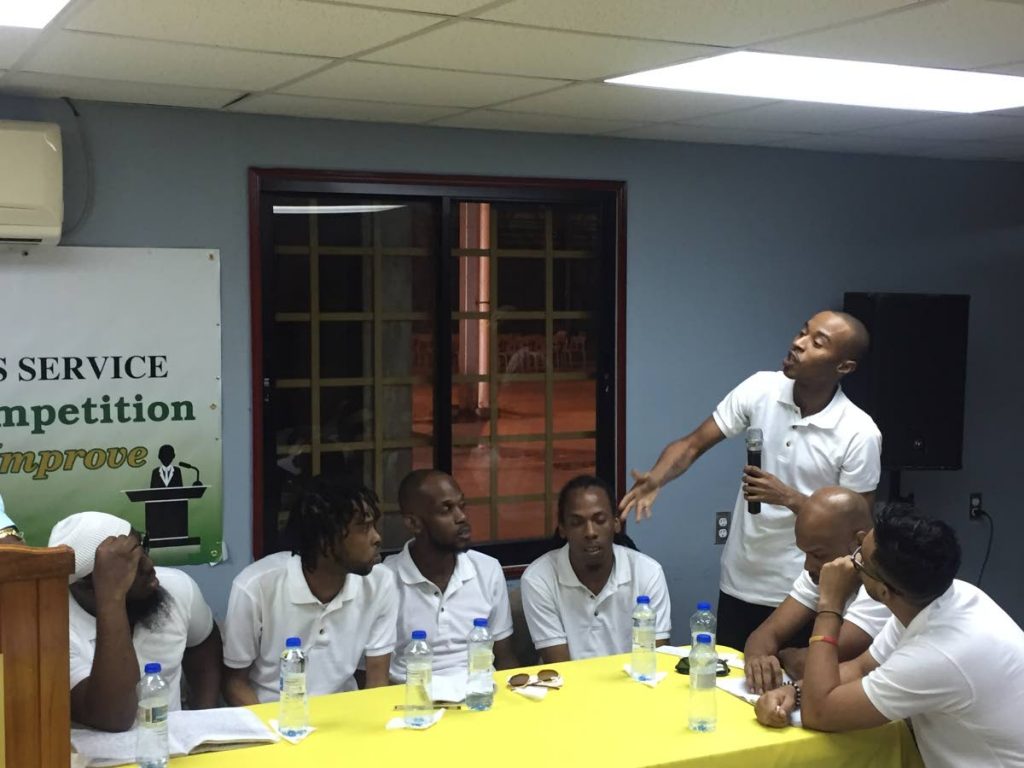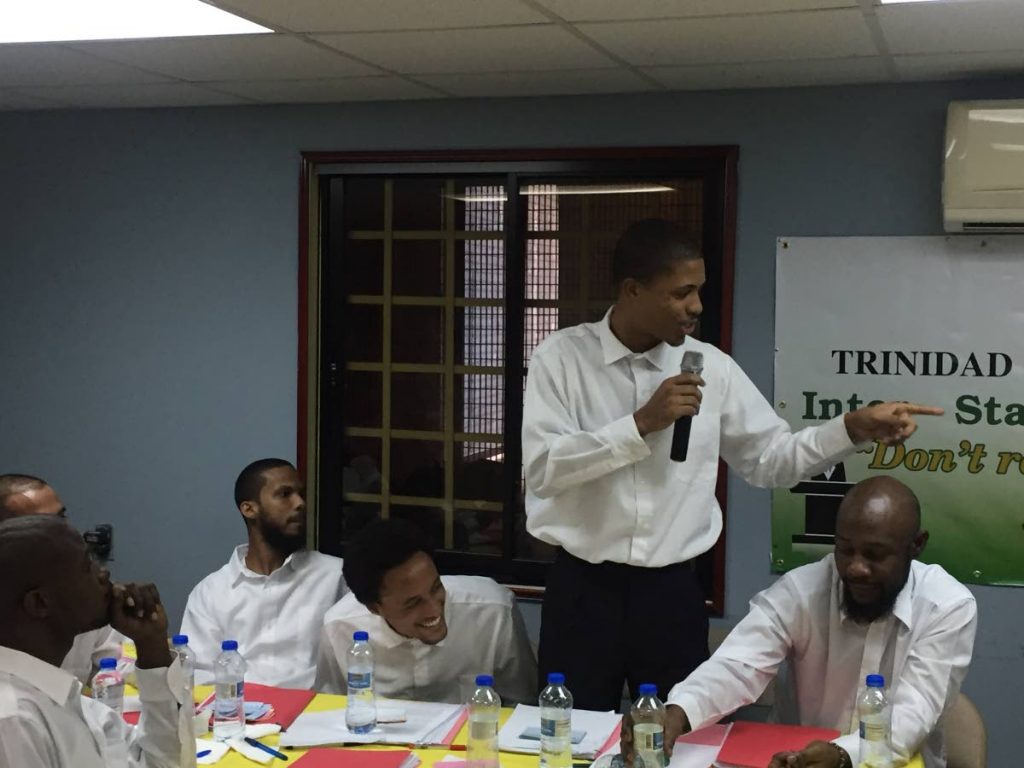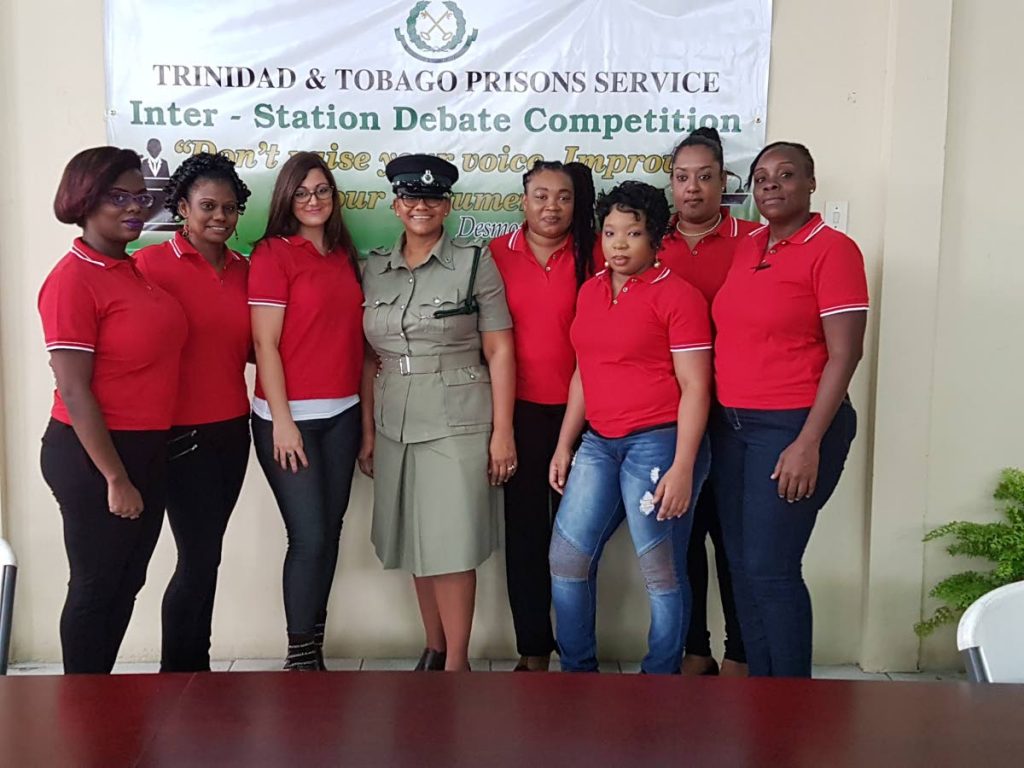The penal system’s great debaters

DEBBIE JACOB
NO one could have predicted the surprising results when the preliminary round of the TT prisons inter-station competition to crown the top prison debate team kicked off at the Women’s Prison on July 16.
In the first debate, Golden Grove Remand Yard beat the Women’s Prison in a heated debate over whether there should be curfews for children under 18.
The Women’s Prison team argued a curfew would keep children safe and curb crime, while Remand Yard argued the curfew violated children’s rights. Pointing out that the majority of children don’t commit crimes, Remand Yard argued a curfew was unnecessary. As a team, Remand Yard poked holes in the women’s argument, shocking all in attendance with their systematic research, sound arguments and growing confidence, thanks to prison officers Avalon Ramsahai and Bharat Seetahal, who prepared the team.
The second debate pitted the Eastern Correctional and Rehabilitation Centre (ECRC) in Santa Rosa against Port of Spain Prison on July 19 at ECRC. Port of Spain Prison debaters, who had already experienced three debates under the guidance of prison officers Birk Ravello and Stephen Farrell, had to defend the use of torture for national security.
A complacent Port of Spain team made two shocking errors, the first one in the question-and-answer phase, where the Port of Spain debater abandoned his team’s position in one question, saying gang members should be tortured, while Port of Spain had argued that only terrorists should be tortured.
Unfortunately, ECRC did not take advantage of the slip to attack its rival.
Then, in the rebuttal stage, a Port of Spain debater made the mistake of opening his arguments by accidentally declaring support for the opposing team’s position, which brought raucous pounding on ECRC’s table.
Shaken by the error, Port of Spain Prison’s debaters recovered and clinched the win when Netfa Felix delivered a firm and passionate closing.
ECRC’s closer Daniyaal Muhammad was not intimidated. His equally passionate closing remarks earned him points as the top debater for the day.
ECRC proved a strong opponent, and a force to be reckoned with in the future – especially with the passionate support of their programmes officer, Tracy Taitt.
MSP debaters exuded confidence when they argued against peer pressure being a major problem in society. They came to intimidate their opponents with a show of unity, down to their attire: ultramarine-blue shirts, black-and-blue bow ties, matching polka-dotted pocket handkerchiefs, name tags and place cards with their positions written on them.

MSP programmes officers Majoon Nancoo and Sherwin Johnson made the team look and act like consummate professionals, and their passionate arguments worked on some judges. However, some of the judges commented that “shouting doesn’t necessarily make a stronger argument.”
Golden Grove debaters peppered their arguments with examples of negative peer pressure, while MSP used three metaphors on the formation of diamonds and oil, along with the birth of babies, as examples of pressure causing something extraordinary.
Golden Grove attacked their metaphors, asking, “Where is the ‘peer’ in that pressure?”
The metaphors worked with some judges, while others found them ineffectual.
In the end, MSP prevailed, but by only nine points, the slimmest margin for a win in all of the preliminary debates, which usually featured a 20-point spread between the winning and losing teams. MSP emerged as a strong, articulate, competitive team.

The preliminary round finished at the Youth Training Centre (YTC), where the YTC team faced inmates from Carrera to debate whether cameras in prison were an invasion of privacy. Cool and composed, the Carrera debaters, well-rehearsed by programme officers Imran Khan and Bennis Sebro, countered YTC’s aggressive tone with a better structured argument. Carrera argued that there was no privacy in prison, so it was impossible to argue that cameras were an invasion of something that didn’t exist.
YTC did not follow the required structure for the question-and-answer phase, but this did not rattle Carrera. In the end, Carrera prevailed with Philbert Foster emerging as the top debater in the entire competition.
The semifinal rounds begin at MSP on August 17, with Port of Spain Prison debating MSP. On August 20, Carrera will debate Remand Yard.
Impressed with the quality of the debates, the Prisons’ Programme Department has decided to stage a People’s Choice award at the finals on September 19 between ECRC and YTC.
The top ten debaters in the preliminary rounds were:
Philbert Foster (Carrera)
Peter Cadette (Golden Grove)
Aaron Charles (Carrera)
Kester Benjamin (MSP)
Pream Badree (MSP)
Daniyaal Muhammad (ECRC)
Arnold Ramlogan (MSP)
Mark Hernandez (Port of Spain Prison)
Dale St. Louis (MSP)
Netfa Felix (Port of Spain Prison)

Comments
"The penal system’s great debaters"